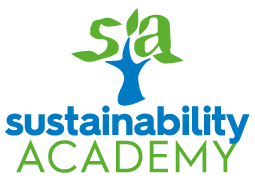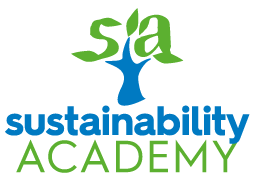Hire or train? Invest in sustainability training!
On any given day, there are hundreds of job advertisements in Toronto requiring some kind of skill in sustainability. Employers need employees who understand the nuances of and necessary systems approach toward sustainability whether it be to improve efficiencies or combat climate change.
What if employers invested in training instead of hiring from outside? They could:
- Improve efficiencies
- Increase productivity
- Build public appeal
- Increase shareholder value
- Aid in employee recruitment
- Increase employee satisfaction and retention
- Promote team building
- Improve quality of work
- Innovate
- Lower business risk
- Save labour
- Save money
- Increase competitive edge
- Save time and cost on supervision
- Create a marketing advantage
- Give back to the community
Sustainability training such as the foundation course offered by the Sustainability Academy offers these benefits and more. Training is of special interest to professionals who want to improve their skills and update their knowledge in Corporate Social Responsibility with practical information on the business case for sustainability; the importance of stakeholder engagement; the use of standards and guidelines to design and implement successful sustainability strategies organization-wide. Without training, sustainability is more a vision than a goal. Yet, sustainability is a tangible process which can be taught and implemented to improve corporations and communities.
The ROI on training is indisputable:
A Nielsen survey in 2015 found that 72% of Millennials "are willing to pay more for products and services that come from companies who are committed to positive social and environmental impact.” This is significant in a country where 8.9 million Canadians were born between 1981 and 2000. Increased public appeal helps increase market share.
More customers lead to greater shareholder value. The American Society for Training and Development found that an increase of $680 in a company’s training expenditures per employee generates nearly a 6 percent improvement in shareholder return. Researchers found that firms investing the most in training and development yielded a return 45 percent higher than the market average when compared to the S&P 500 for the same period, along with higher profit margins and higher income per employee.
Increasing efficiencies is a profitable and "low-hanging" fruit. After training, an HSBC "Climate Champion" noticed that computers left on overnight were a huge energy drain. The company implemented software to automatically shut down computers along with an awareness program which together saved 4 million kilowatts per year of electricity and about 900 metric tons of carbon dioxide, which shaved $332,000 on energy bills.
Increasing productivity through better morale, professional development and team building makes for more satisfied employees. Research has found that a 2-percent increase in productivity can net a 100 percent return on investment in training (CompTIA and Prometric). For every dollar spent on training, Motorola found nearly a 30 percent gain in productivity over three years. Motorola training also reduced costs by over $3 billion and increased profits by 47 percent.
Training also leads to better retention as Louis Harris and Associates found, showing that 41% of employees without training opportunities plan to leave in one year versus only 12% of those who felt they had excellent training opportunities. An AON survey found that employees rank "opportunities for personal growth" ahead of salary!
In 2012, Kruger Products partnered with the Science Teachers’ Association of Ontario (STAO) to share with students what it had learned from its sustainability efforts. The collaboration with STAO focused on connecting sustainability with real world applications and highlighting successful Canadian practices in the classroom. Kruger Products and STAO’s curriculum development team of current and retired teachers explored practices from new processes and technologies to products and corporate decision-making. STAO developed modules for elementary and high school science teachers. The modules were downloaded more than 8,000 times in the first year.
Most companies do not have the resources or timeframe to take sustainability into the classroom. They need to train employees in-house. The Sustainability Academy offers an online option that is affordable and efficient. Companies can co-brand the trainings, tailoring them to their specific needs, for example, providing education on sustainability in Supply Chains to key suppliers. The ROI from sustainability education is tangible. With a critical mass of those who understand sustainability and all its components, we all benefit from increased productivity, increased morale and improving our carbon footprint. The Sustainability Academy has set the ambitious goal of generating this critical mass by training 100,000 sustainability practitioners by 2020!
CSE also offers advanced in-person training with its Certified Sustainability Practitioner (CSR) Program. The 2017 Advanced Edition will be held in Toronto, April 5-6, 2017. The two-day training provides the latest practical tools and resources required to implement or upscale corporate sustainability to drive initiatives to the next level by generating value and creating effective strategies. Executives from Fortune Global 500 companies, local governments and academia have participated, including Pan American Silver and University of Toronto. Click here to see the training agenda.
Whether sending key employees for advanced training or sponsoring a Sustainability Academy cohort, education is critical for our common good.
Contact:
Sustainability Academy
www.sustainability-academy.org
sustainability@cse-net.org


Comments
There are 0 comments on this post















